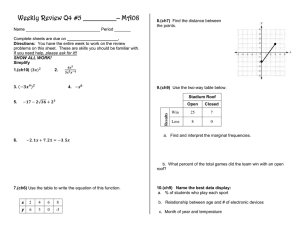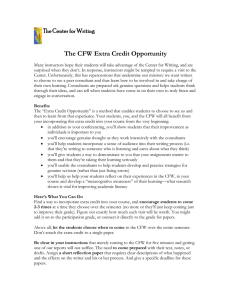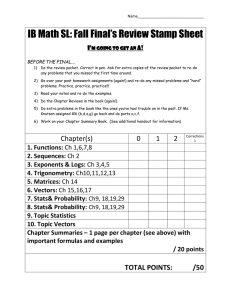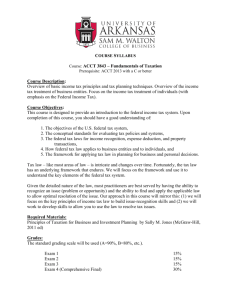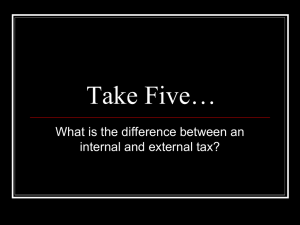p1 of 2 Course Outline (Prerequisite: Geog 2240)
advertisement
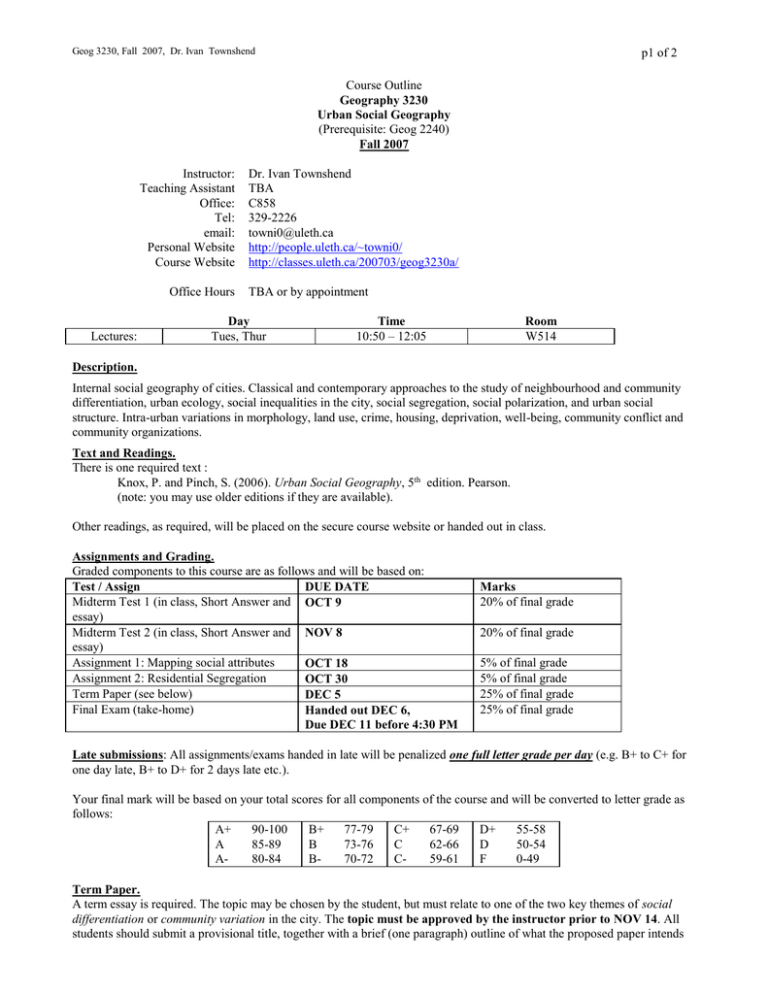
Geog 3230, Fall 2007, Dr. Ivan Townshend p1 of 2 Course Outline Geography 3230 Urban Social Geography (Prerequisite: Geog 2240) Fall 2007 Instructor: Teaching Assistant Office: Tel: email: Personal Website Course Website Office Hours Lectures: Dr. Ivan Townshend TBA C858 329-2226 towni0@uleth.ca http://people.uleth.ca/~towni0/ http://classes.uleth.ca/200703/geog3230a/ TBA or by appointment Day Tues, Thur Time 10:50 – 12:05 Room W514 Description. Internal social geography of cities. Classical and contemporary approaches to the study of neighbourhood and community differentiation, urban ecology, social inequalities in the city, social segregation, social polarization, and urban social structure. Intra-urban variations in morphology, land use, crime, housing, deprivation, well-being, community conflict and community organizations. Text and Readings. There is one required text : Knox, P. and Pinch, S. (2006). Urban Social Geography, 5th edition. Pearson. (note: you may use older editions if they are available). Other readings, as required, will be placed on the secure course website or handed out in class. Assignments and Grading. Graded components to this course are as follows and will be based on: Test / Assign DUE DATE Midterm Test 1 (in class, Short Answer and OCT 9 essay) Midterm Test 2 (in class, Short Answer and NOV 8 essay) Assignment 1: Mapping social attributes OCT 18 Assignment 2: Residential Segregation OCT 30 Term Paper (see below) DEC 5 Final Exam (take-home) Handed out DEC 6, Due DEC 11 before 4:30 PM Marks 20% of final grade 20% of final grade 5% of final grade 5% of final grade 25% of final grade 25% of final grade Late submissions: All assignments/exams handed in late will be penalized one full letter grade per day (e.g. B+ to C+ for one day late, B+ to D+ for 2 days late etc.). Your final mark will be based on your total scores for all components of the course and will be converted to letter grade as follows: A+ 90-100 B+ 77-79 C+ 67-69 D+ 55-58 A 85-89 B 73-76 C 62-66 D 50-54 A80-84 B70-72 C59-61 F 0-49 Term Paper. A term essay is required. The topic may be chosen by the student, but must relate to one of the two key themes of social differentiation or community variation in the city. The topic must be approved by the instructor prior to NOV 14. All students should submit a provisional title, together with a brief (one paragraph) outline of what the proposed paper intends Geog 3230, Fall 2007, Dr. Ivan Townshend p2 of 2 to deal with and how it is linked to either of the two key themes identified above. A few illustrative references should be included. The instructor will review the topics for suitability. The paper should be about 2500 words, and MUST include references for AT LEAST TEN journal articles, books, or book chapters. Websites and lecture notes do not count as part of the 10 references required, although you may use these in addition to the above. All students must submit their term paper in hard copy form (i.e. printed), as well as on diskette or CD. Failure to comply with the term paper formatting guidelines will result in the grade being reduced by one full letter grade. WARNING: Term papers may be subject to electronic plagiarism detection software! Provisional Schedule. Fall 2007 SEP OCT NOV DEC Provisional Topic Course Intro, course outlines The study of urban geography The sociospatial dialectic Econ/social context of city life Typological Approaches Early Ecological Approaches and models Early Ecological Approaches and models Describing social differentiation and inequality (Booth etc) Social Area Analysis MIDTERM TEST 1 (20%) Factorial Ecology Readings (Text) Additional Readings (see website) R T R T R T 6 11 13 18 20 25 R 27 T 2 R T R 4 9 11 T 16 Factorial Ecology, Social Areas (Beer Game) R 18 Residential Segregation, Assign 1 due Ch8 T 23 Ch9, Ch10 R 25 T 30 R T R T R T 1 6 8 13 15 20 Comprehensive model of urban social differentiation Comprehensive model of urban social differentiation Other "Content" features , Assign 2 due Gentrification Boom (movie) MIDTERM TEST 2 (20%) Housing and Mobility Behavioural variations in the city E.g. Community organizations, social networks, neighbouring, shopping, etc. R 22 T 27 R 29 T 5 R 6 T 11 E.g. Crime, etc. Ch1 Ch1 Ch2 Ch7 Ch7 Ch7 Soja 1980 Soja 1980 McGahn Ch1 McGahn Ch2; Wirth 1938; Simmel; Entrekin 1980 McGahn Ch2; Wirth 1938; Simmel; Firey 1945 Ch4, Ch8 Booth 1893; Ward and Clark 1990; Orford et al. 2002 Bell 1953; Davies 1984 Ch9; Ch4, Ch8 Janson 1980; Davies 1984 Ch9; Rees 1971; Clark Davies Johnston 1974 Johnston 1971; Davies 1984 Ch9; Rees 1971; Clark Davies Johnston 1974; Davies and Townshend 1994; Townshend 2002. Ch4, Ch8 Ch9, Ch10 Ch6, Ch9, Ch10, Ch12 Ch6 Fong and Shibuya 2000; Kazemipur, 2000; Massey and Denton 1988; Townshend and Walker 2002 Davies and Herbert Ch3 , Townshend and Davies 1999; Townshend 2002 Davies and Herbert Ch3 , Townshend and Davies 1999; Townshend 2002 Peponis (nd); Whitehand 1998; Larkham 1998; Moudon 1998; Ley 1986 Ch6, Ch12 Townshend and Aldridge 2004 Ch9, Ch12 Ch9, Ch10, Ch13 Davies and Townshend 1994; Townshend 2002 Ch9, Ch10 Boggs 1965; Herbert 1976; Smith 1984; Herbert and Hyde 1985; Herbert 2002; Racine 2002 Cognitive variations in the city Ch9, Ch10 Pocock 1976; Matthews 1984; Lloyd and Heivly 1987; Lynch: http://www.csiss.org/classics/content/62 E.g. Mental mapping, fear of crime, etc. Affective variations in the city. Term Paper Due Ch9, Ch10 Ch9, Ch10 Kitchin 1996; Murray and Spencer 1979; Pain 1997 Spencer and Dixon 1983; Davies and Townshend 1999; Townshend 2001; 2002; Townshend and Aldridge (forthcoming) Last class, Urban Well Being, TH Final handed out TH Final Due (25%) Ch9, Ch10 Giggs 1973; Townshend 2001
